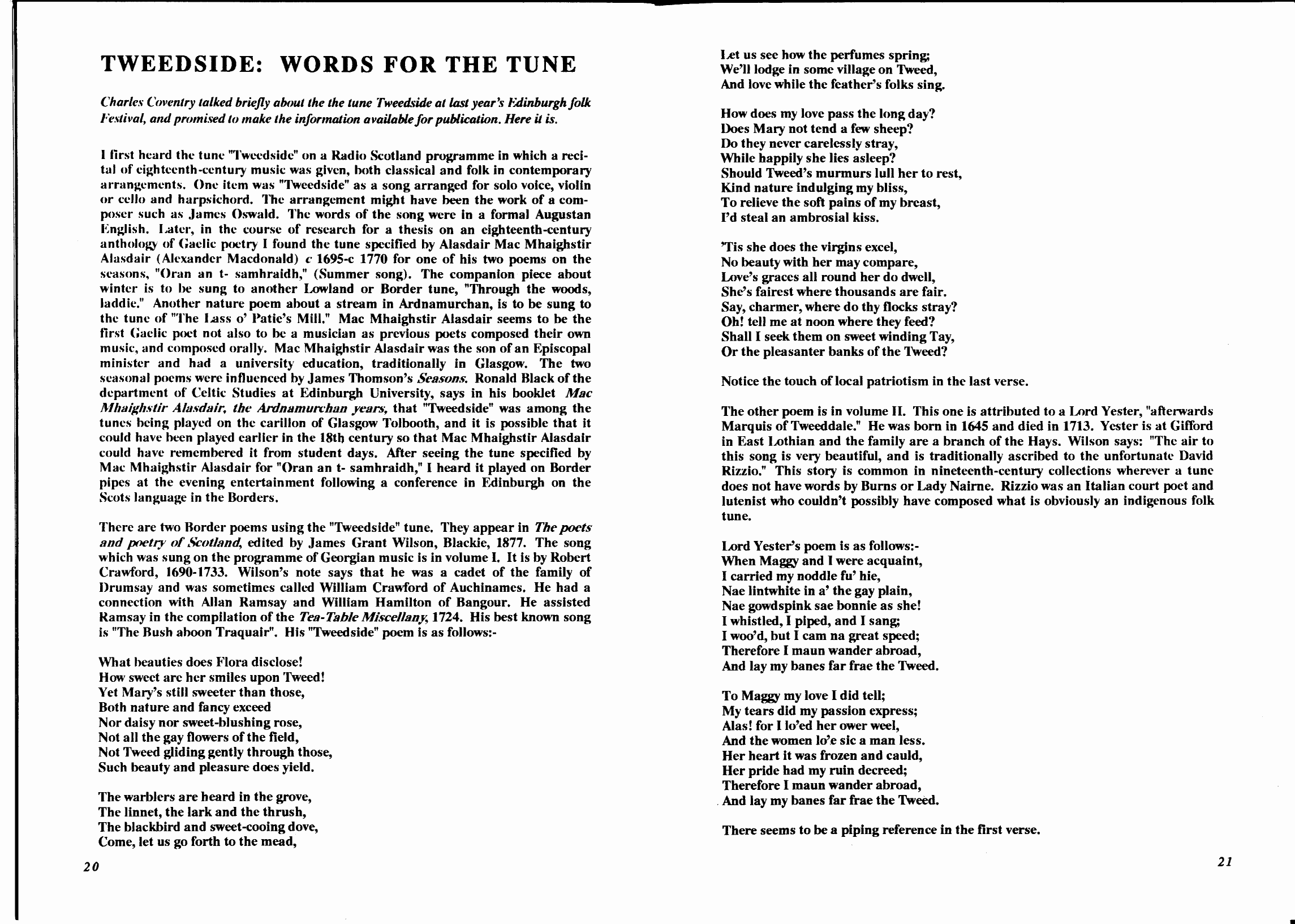Tweedside: Words For The Music

Charles Coventry talked briefly about the tune Tweedside at last year’s Edinburgh folk Festival, and promised to make the information available for publication. Here it is.
I first heard the tune “Tweedside" on a Radio Scotland programme in which a recital of eighteenth-century music was given, both classical and folk in contemporary arrangements. One item was “Tweedside” as a song arranged for solo voice, violin or cello and harpsichord. The arrangement might have been the work of a composer such as James Oswald. The words of the song were in a formal Augustan English, Later, in the course of research for a thesis on an eighteenth-century anthology of Gaelic poetry I found the tune specified by Alasdair Mac Mhaighstir Alasdair (Alexander Macdonald) c 1695-c 1770 for one of his two poems on the seasons, “Oran an t- samhraidh,” (Summer song). The companion. piece about winter is to be sung to another Lowland or Border tune, “Through the woods, Laddie.”
Another nature poem about a stream in Ardnamurchan, is to be sung to the tune of “The Lass o’ Patie’s Mill.” Mac Mhaighstir Alasdair seems to be the first Gaelic poet not also to be a musician as previous poets composed their own music, and composed orally. Mac Mhaighstir Alasdair was the son of an Episcopal minister and had a university education, traditionally in Glasgow. The two seasonal poems were influenced by James Thomson’s Seasons.
Ronald Black of the department of Celtic Studies at Edinburgh University, says in his booklet Mac Mhaighstir Alasdair, the Ardnamurchan years, that “Tweedside” was among the tunes being played on the carillon of Glasgow Tolbooth, and it is possible that it could have been played earlier in the 18th century so that Mac Mhaighstir Alasdair
could have remembered it from student days, After seeing the tune specified by Mac Mhaighstir Alasdair for “Oran an t- samhraidh,” I heard it played on Border pipes at the evening entertainment following a conference in Edinburgh on the Scots language in the Borders.
There are two Border poems using the “Tweedside” tune, They appear in The poets and poetry of Scotland, edited by James Grant Wilson, Blackie, 1877. The song which was sung on the programme of Georgian music is in volume 1. It is by Robert Crawford, 16901733. Wilson’s note says that he was a cadet of the family of Drumsay and was sometimes called William Crawford of Auchinames. He had a connection with Allan Ramsay and William Hamilton of Bangour, He assisted Ramsay in the compilation of the Tea-Table Miscellany, 1724. His best known song is “The Bush aboon Traquair”. His “Tweedside” poem is as follows:-
What beauties does Flora disclose!
How sweet arc her smiles upon Tweed!
Yet Mary’s still sweeter than those,
Both nature and fancy exceed
Nor daisy nor sweet-blushing rose,
Not all the gay flowers of the field, Not Tweed gliding gently through those, Such beauty and pleasure does yield.
The warblers are heard in the grove,
The linnet, the lark and the thrush,
The blackbird and sweet-cooing dove,
Come, let us go forth to the mead,
Let us see how the perfumes spring;
We'll lodge in some village on Tweed, And love while the feather’s folks sing.
How does my love pass the long day?
Does Mary not tend a few sheep? Do they never carelessly stray, While happily she lies asleep?
Should Tweed’s murmurs lull her to rest,
Kind nature indulging my bliss, To relieve the soft pains of my breast, I’d steal an ambrosial kiss.
‘Tis she does the virgins excel,
No beauty with her may compare,
Love’s graces all round her do dwell, She’s fairest where thousands are fair.
Say, charmer, where do thy flocks stray?
Oh! tell me at noon where they feed?
Shall I seek them on sweet winding Tay, Or the pleasanter banks of the Tweed?
Notice the touch of local patriotism in the last verse.
The other poem is in volume II. This one is attributed to a Lord Yester, “afterwards Marquis of Tweeddale.” He was born in 1645 and died in 1713. Yester is at Gifford in East Lothian and the family are a branch of the Hays. Wilson says: “The air to this song is very beautiful, and is traditionally ascribed to the unfortunate David Rizzio.” This story is common in nineteenth-century collections wherever a tune does not have words by Burns or Lady Nairne. Rizzio was an Italian court poet and lutenist who couldn’t possibly have composed what is obviously an indigenous folk tune.
Lord Yester’s poem is as follows:- ‘When Maggy and I were acquaint,
I carried my noddle fu’ hie,
Nae lintwhite in a’ the gay plain, Nae gowdspink sae bonnie as she!
I whistled, I piped, and I sang;
I woo'd, but I cam na great speed;
Therefore I maun wander abroad, And lay my banes far frae the Tweed.
To Maggy my love I did tell;
My tears did my passion express;
Alas! for I lo’ed her ower weel, And the women lo’e sic a man less.
Her heart it was frozen and cauld,
Her pride had my ruin decreed; Therefore I maun wander abroad,
And lay my banes far frae the Tweed.
There seems to be a piping reference in the first verse.
Norham Castle on the banks of the Tweed by J.M.W. Turner R.A.
